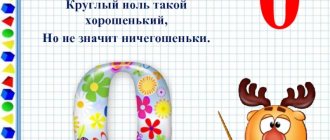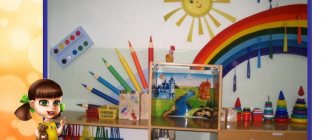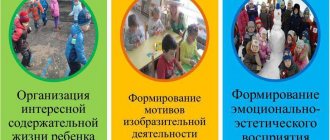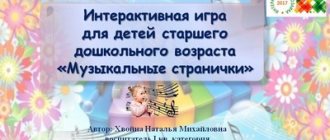Increasing the effectiveness of parent-child interaction:
- — gradual acceptance by foster parents of an adopted child with disabilities, analysis of internal problems that interfere with this;
- — developing in students a positive attitude towards significant persons, increasing their authority, etc.
- — training foster parents in the ability to balance demands with the age and health of the child, present them adequately and consistently, provide the freedom necessary for the formation of independence, and increase confidence in the child;
- — prevention of the occurrence and correction of educational disorders in foster parents (formation of ideas about educational disorders, their consequences, creation of conditions for parents to understand the causes leading to violations).
Working with the ideas of foster parents and adopted children with disabilities about family relationships:
- - increasing self-esteem in students, creating a situation of success in the family circle, reducing the feeling of isolation by increasing emotional closeness in family relationships, increasing the quantity and quality of time spent together, teaching parents the ability to create an atmosphere of acceptance in the family; developing the authority of parents, teaching them the ability to adequately distribute responsibility between themselves and the pupil, etc.
In the process of rapprochement, the following tasks are solved:
- — optimization and strengthening of relationships in a foster family with an adopted child with disabilities;
- — assistance in mastering new roles by family members;
- - reducing emotional tension, conflict in the family, improving the psychological climate in it;
- — development by the foster family of constructive strategies for coping with emerging educational difficulties;
- — increasing the efficiency of family functioning in the field of correcting the impaired development of an adopted child with disabilities and overcoming the negative consequences of his past experience.
MAGAZINE Preschooler.RF
The work program of the Parents' Club for the adaptation of children and parents to preschool educational institutionsThe work program is drawn up in accordance with regulatory documents:
- Federal Law of December 29, 2012 No. 273-FZ “On Education in the Russian Federation” ;
- Federal State Educational Standard for preschool education, approved by order of the Ministry of Education and Science of Russia dated October 17, 2013 No. 1155.
The program also takes into account the recommendations of the letter of the Ministry of Education and Science of Russia dated December 11, 2006 No. 06-1844 “On approximate requirements for additional education programs for children .
When entering a preschool educational institution (DOU), all children experience adaptation stress. The adaptive capabilities of a child of early and early preschool age are limited, so a sudden transition of a child to a new social situation and a long stay in a stressful state can lead to emotional disturbances or a slowdown in the rate of psychophysical development.
It is necessary to help children overcome the stress of admission and successfully adapt to a preschool or institution.
Young children are emotional and impressionable. They tend to quickly become infected with strong, both positive and negative, emotions of adults and peers, and imitate their actions. These features formed the basis for constructing a cycle of lessons. To reduce the impact of stress factors, classes are conducted with the participation of parents. In the presence of parents, children are more willing to make contact with a teacher or psychologist, interact with peers, participate in joint outdoor games, and are more actively interested in their environment and toys. It is very important that the child gains his first experience in a preschool institution with the support of a loved one. Joint classes are a kind of “master class” for parents, as the psychologist shows them new means and ways of communicating with children.
The informal atmosphere of classes contributes to more active and open communication between the teacher and psychologist and parents. The teacher takes an active part in the classes. He adopts the methods and techniques used by the psychologist in various situations, notes the games that children like the most and uses them in his work.
Goal: to create a favorable psycho-emotional climate and comfort for young children in the family and preschool institutions.
Tasks:
Create conditions for:
- relieving emotional and muscle tension in young children
- reducing impulsivity, excessive physical activity, anxiety, aggression
- development of attention, perception, speech, imagination, skills of interaction with each other in children
- development of a sense of rhythm, general and fine motor skills, coordination of movements; gaming skills, voluntary behavior in children
- to form an adequate perception of parents of their child
Contribute:
- creating a favorable microclimate in the family to maximize the development of the child’s personal and social resources
- formation of partnerships between parents and institutions that provide interconnection and complementarity of knowledge, enrichment of experience
- personal and social development of parents, formation of skills of social activity and constructive behavior.
The program was developed using the methodology described by A.S. Ronzhina in the book “Psychologist’s classes with children 2-4 years old during the period of adaptation to a preschool institution .
Main activities:
- educational (educational) - the formation in parents of an adequate perception of the child, acceptance of his characteristics, pace and originality of psychophysical development. Thanks to educational activities, mutual understanding and interaction between specialists and parents are formed, and attitudes towards the child and themselves change. At club meetings, parents receive additional information about the characteristics of the child’s development, directions of his upbringing and education.
- psychoprophylactic - reducing the level of psycho-emotional stress, forming a positive image of the future child and the family as a whole, psychological and pedagogical support for the family. Thanks to psychoprophylactic methods, parents become calmer and have a desire to cooperate. At the same time, there is a significant stabilization of the psycho-emotional state in children.
- integration - social self-realization of parents, changing society's attitude towards them. Thanks to appropriate activities, objective involvement in public life and social significance is formed, which significantly affects the development of the child.
Club participants: educational psychologist, music director, teacher, speech therapist.
The basic means of work are a variety of games with speech accompaniment: round dances, marches, songs, nursery rhymes, rhymes, “okay” and “catch-up” . They quickly involve children in their rhythm, switch them to different types of activities, unite them, and set a positive emotional mood. In these games, even shy, introverted children gradually overcome their internal barrier and make contact with adults and peers.
1. 2 Planned results of mastering the program:
Children: successful adaptation to preschool education;
Parents: developing an adequate perception of their child; the formation of a favorable microclimate in the family to maximize the development of the child’s personal and social resources; formation of partnerships between parents and the institution, enrichment with experience.
| Next > |
Family Club Program
Irina Stefan
Family Club Program
Family club work plan
"WE ARE TOGETHER"
Explanatory note
In accordance with the Law of the Russian Federation “On Education”
and Model regulations on a preschool institution, one of the main tasks of a kindergarten is interaction with the family to ensure the full development of the child. Currently, the problem of interaction with family is outlined by federal state requirements.
Modern parents have a hard time due to lack of time and busyness at work, inability to choose methodological literature and practical aids for the development of children. Many parents do not understand the importance of working with young children. But preschool age is the time when the foundations of a person’s physical, mental, and personal development are laid. It is this period of childhood that is very important, since a lack of education at an early age results in irreparable losses.
How to attract the attention of parents to the problem of raising preschool children? How to build trusting relationships with parents who come to a preschool educational institution and are worried about their children? Unfortunately, traditional work with parents uses insufficiently effective methods.
In our opinion, this problem can be solved by developing new innovative forms of interaction with parents, introducing programs to educate and train families . Based on the above, we came to the conclusion that it is necessary to create an innovative program of cooperation and interaction between preschool institutions and parents.
The implementation of this program is carried out within the framework of the parent club “We are together”
on the basis of the BDOU
"Lyubinsky kindergarten No. 1"
.
Parent club program “We are together”
is aimed at enriching parents with psychological and pedagogical knowledge and practical skills in raising children through their involvement in cooperation with teachers, developing friendly relations with other families for the successful development of the basic general education
program .
Thus, the relevance of this program lies in the fact that its content meets the requirements for updating the preschool educational strategy, within the framework of which preschool specialists create optimal conditions for improving the culture of psychological and pedagogical knowledge of parents, thereby guiding them to increase the activity of their participation in educational activities. educational process with the aim of developing the child’s personality.
The novelty and practical significance of the parent club program is expressed in the fact that its implementation contributes to the creation of a unified educational environment in the preschool institution and family; development of the psychological and pedagogical competence of parents, increasing the responsibility and interested attitude of parents for raising children in a family environment based on the use of innovative forms of interaction; parents are active participants in the implementation of the main general educational program of a preschool institution and the degree of trust and respect for preschool employees increases, which leads to an increase in the image of the kindergarten.
The parent club program makes it possible to rebuild insufficiently effective methods of interaction and cooperation, as well as psychological and pedagogical education of the modern family, and give it the innovative direction necessary to meet the needs of the new modern parent.
The goal of the program is to create an innovative system of cooperation and interaction between a preschool institution and a family, ensuring the unity of educational and educational influences in the process of raising a preschooler through the development of a system of psychological and pedagogical knowledge.
Tasks:
1. Increase the level of psychological and pedagogical culture of parents by involving them in participation in theoretical and practical classes/events.
2. Raise parents’ awareness of their rights and responsibilities for creating optimal conditions for the upbringing and development of a child in the family.
3. Expand the educational potential of the family by improving scientific and practical skills and abilities in raising children.
4. Involve parents in active participation in the educational process through the introduction of innovative forms in the practice of working with families.
Organization of the family club :
1. The activities of the club are carried out in accordance with the annual plan of the preschool educational institution.
2. The work of the Club is organized taking into account the age of the children.
3. Club are held at least twice a year and as necessary.
4. Club for employees and parents are advisory in nature.
5. Club :
• Draws up a work plan for the family club .
• Prepares meeting materials (storage period is three years)
.
• Organizes the activities of the family club .
• Informs club about upcoming events.
The life of the family club is not limited .
Rights and obligations of the parties
1. The activities of the family club are carried out on a voluntary basis.
2. The preschool educational institution provides premises for family club .
3. Club have the right to give recommendations, make proposals, and actively participate in events organized both for club and by themselves.
4. Freely express and defend your own point of view.
5. Participate in the development of the club’s program of activities .
6. Exchange personal experiences in solving certain family problems.
Implementation of the parent club program “We are together”
designed for 1 year (during the stay of children in the senior group, the place of implementation is the
Lyubinsk Kindergarten No. 1
).
Participants in the program :
Club leaders , preschool specialists, parents, children.
The formation of a group of parents in the club occurs on a voluntary basis. The quantitative composition of the group is from 10 to 15 people. The program includes five sessions. Parent meetings are held once every 1-2 months. A variety of forms will help introduce parents to ways of interacting in a team of like-minded people. And teachers analyzed those forms of work that parents liked most and brought effectiveness. The duration of the meeting does not exceed 30-40 minutes (rarely 1 hour, which significantly saves parents’ time and increases the efficiency of mastering the content of the program .
Club documentation :
1. Long-term work plan for the family club .
2. Notes of family club .
3. A log of visits to family club .
the family club meeting .
5. Final presentation of the results of work for the year.
Expected results of the program
1. Establishing close contact and mutual understanding with the family, directing parents towards active interaction.
2. Achieving a sufficient level of awareness of parents about the process of adaptation, preventing and overcoming possible difficulties.
3. Improving the psychological and pedagogical culture of parents in matters of development, education and health of a young child.
4. Increasing the degree of parental involvement in the educational process of the kindergarten.
Ways to check expected results.
The effectiveness of the implementation of the program is determined through reflection of each event, feedback sheets, surveys, questionnaires, and conversations. In addition, the effectiveness of the implementation of the program can be determined by the results of the number of visitors and the activity of parents at meetings and meetings, the level of parental satisfaction and the effectiveness of the forms of work used, promising technologies in working with families, analysis of the degree of satisfaction of teachers with the work on implementing the program , monitoring of educational process, children's mastery of the general education program at the end of the school year.
Month Contents and purpose of work Responsible
September Organizational meeting.
Purpose: To introduce the age-related developmental characteristics of children 5-6 years old. Discuss topics for family club for the new school year.
Form of work: parent meeting
October “Omsk Irtysh region – my native land”
Goal: To introduce parents to the partial program “Little Resident of the Omsk Irtysh Region”
.
Present workbooks to parents and explain the importance of studying this program for the overall development of children.
Show didactic games. Encourage parents to participate in the joint educational process through conversations with children at home.
Form of work: consultation with presentation
Parents
January “Experimenting with children”
Goal: Enriching parental ideas about the importance of experimental activities for children of senior preschool age. Introducing parents to the features of experimental activities in older preschool age.
1. Consultation: “Experimental activities of children at home. What can’t and what should be done to maintain interest in experimentation?”
2. Conducting experiments by a teacher with children.
3. Parents showing elementary experiments for children.
Form of work: consultation, master classes.
May “Features of gender education of preschool children”
Goal: Involving parents in the issue and problem of gender education of preschoolers.
1.Consultation: “Features of gender education of preschool children”
Presentation of the club's business card at the festival of family clubs in preschool educational institutions .
Purpose: Summing up the work of the club .
Involving parents in participating in events held at the preschool educational institution.








